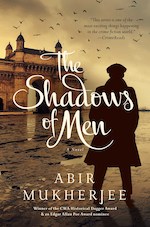Evie Dunmore's debut novel, Bringing Down the Duke, was rapturously received by romance fans for its witty love story and depiction of the Victorian women's suffrage movement. Dunmore returns to her League of Extraordinary Women series with A Rogue of One's Own, a delicious enemies-to-lovers romance between passionate suffragette Lady Lucie and her longtime nemesis, Lord Tristan Ballentine. BookPage is thrilled to share an exclusive excerpt below!
The corridor drifted past without sound. Her face felt frozen. She all but shouldered past the receptionist announcing her into the office.
She was greeted by the soles of a pair of large shoes, propped up on a vast desk. A spread-open newspaper concealed the owner of said shoes.
Her heart plummeted.
Only one gentleman of her acquaintance would read the Times like a pantomime villain.
The paper lowered, and lion eyes met hers.
At once, the air between them burned. Her next breath scorched her lungs like hot steam.
“Lady Lucie.” Tristan took his feet off the desk. “I’ve been expecting you.”
Her throat was jammed with too many words.
He was dressed smartly, no crimson velvet in sight, just gray, immaculately tailored wool and muted silk. It made him look alien.
It made it all the more real.
He was watching her expectantly as he folded up the paper, and when she only stood and stared, her pulse thudding in her ears, he gave a shrug, rose and meandered over to the sideboard.
Tristan Ballentine was walking around in the offices of London Print as if he owned them.
Because he did.
She swayed a little on her feet.
“May I offer you something to drink?” His long fingers played over bottle necks. “Brandy, Scotch, sherry?”
She crossed her arms over her chest, holding on tight. Her pulse was beating alarmingly fast. “Since when?” she demanded.
He uncorked a bottle and held it to his nose for a sniff. “Since when what?”
The innocent curve of his mouth sent lightning crackling over her nerves.
“Since when do you own shares in this company?”
“Ah. Well, I bought the first 25% around six years ago, before my first tour. The remaining shares I purchased yesterday. At a bargain price, too, once I informed the previous owner of a suffragist takeover. Are you sure you don’t care for a brandy? You look a bit peaked.”
Her heart thudded, threatening to pound a hole through her ribs. Her nemesis owned the other half of her publishing house.
Her gaze narrowed. “You,” she said, “you were the one who alarmed the board and pressured Mr. Barnes.”
“I did, yes.” He did not look remotely contrite. “I had to buy some time, to secure the necessary capital and to confirm my suspicions that you were planning mischief before actually making an offer.”
His suspicions—had this been the reason behind their meeting at Blackwell’s? Of course.
She had known. She had known he had been trouble and she had gone to meet him anyway.
“Why?” she asked, hating the tremor in her voice. “Why London Print?”
He poured himself two finger widths of liquor as he strolled back toward his desk, taking the bottle with him. “Why would I not?” he said. “It’s a publishing house with a vast readership, with still considerably under-explored potential. Anyone with an eye on publishing and a passive income stream would be interested.”
The words hit like slaps. They were the same words she had given Mr. Barnes, when she had used economics to conceal her true intent of using the magazines to further the Cause. What was Tristan hiding? He should be living off his father’s allowance like any aristocratic male heir, not pondering passive income streams.
“If it is money you want, pick another business,” she said.
He cocked his head. “But why? Both my purchases preceded yours. One could say I was there first.”
“You cad,” she muttered, trembling. It seemed to amuse him.
“Throw a man a bone, Lucie. I’m back from the war. Perhaps I like the idea of having something to do. And London Print owns the rights to my literary works, so I suppose you could call me emotionally invested in my revenue.”
“Literary works?”
He sent her a pitying look from beneath his long lashes. “Romantic poetry.”
He might as well have talked Mandarin to her.
And then it dawned on her.
She shook her head, bemused. “Are you claiming you are the author of A Pocketful of Poems?”
“I am,” Tristan said. He studied her over the rim of his whiskey glass, an expectant gleam in his eyes. “How do you like it?”
The poetry? The poetry was published by Anonymous. She had suspected a woman to be the author, as was so often the case with Anonymous. Apparently, the truth was more outrageous. Apparently, there was a reality where her business partner was a notorious rake and where Lord Ballentine, most shallow of men, was an acclaimed poet. She had quite possibly fallen through a rabbit hole.

 Big Bad Wolf by Suleikha Snyder
Big Bad Wolf by Suleikha Snyder First Comes Like by
First Comes Like by  Yes & I Love You by
Yes & I Love You by  Life’s Too Short by
Life’s Too Short by  Second First Impressions by
Second First Impressions by  The Soulmate Equation by
The Soulmate Equation by  One Last Stop by
One Last Stop by  Someone to Cherish by
Someone to Cherish by  Isn’t It Bromantic? by
Isn’t It Bromantic? by  The Heart Principle by
The Heart Principle by 

 Blood Grove by
Blood Grove by  Win by
Win by  Northern Spy by Flynn Berry
Northern Spy by Flynn Berry While Justice Sleeps by Stacey Abrams
While Justice Sleeps by Stacey Abrams Dream Girl by
Dream Girl by  The Turnout by
The Turnout by  The Shadows of Men by
The Shadows of Men by  For Your Own Good by
For Your Own Good by  Find Me by
Find Me by 
 Beneath the Keep by
Beneath the Keep by 
 A Court of Silver Flames by
A Court of Silver Flames by  A Desolation Called Peace by
A Desolation Called Peace by  Black Water Sister by
Black Water Sister by  The Chosen and the Beautiful by Nghi Vo
The Chosen and the Beautiful by Nghi Vo The Last Graduate by
The Last Graduate by  The Book of Accidents by
The Book of Accidents by  Jade Legacy by
Jade Legacy by 




 Black Knights Inc.
Black Knights Inc. Fatal
Fatal The O’Malleys
The O’Malleys Anita Blake, Vampire Hunter
Anita Blake, Vampire Hunter Argeneau
Argeneau Kate Daniels
Kate Daniels Psy-Changeling
Psy-Changeling





 Isabel Cooper
Isabel Cooper Elizabeth Kingston
Elizabeth Kingston Jeannie Lin
Jeannie Lin


 Amanda Quick
Amanda Quick

 The Coincidence Makers by Yoav Blum
The Coincidence Makers by Yoav Blum Creatures of Will and Temper by Molly Tanzer
Creatures of Will and Temper by Molly Tanzer Jade City by Fonda Lee
Jade City by Fonda Lee The Philosopher’s Flight by Tom Miller
The Philosopher’s Flight by Tom Miller The Power by Naomi Alderman
The Power by Naomi Alderman The Tethered Mage by Melissa Caruso
The Tethered Mage by Melissa Caruso Torn by Rowenna Miller
Torn by Rowenna Miller Winter of Ice and Iron by Rachel Neumeier
Winter of Ice and Iron by Rachel Neumeier





